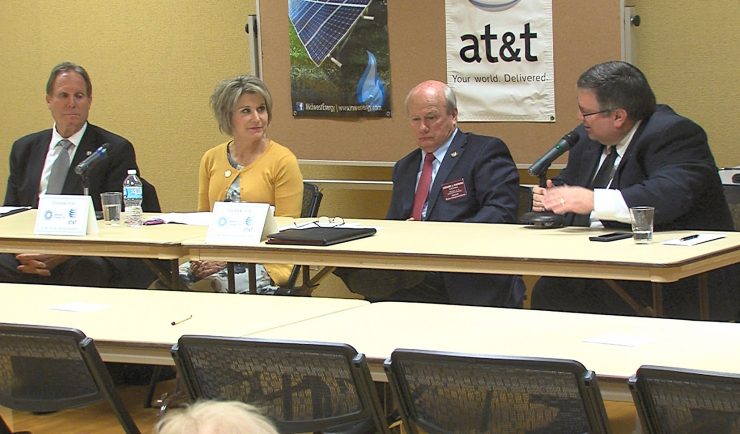
By BECKY KISER
Hays Post
The first 2019 legislative coffee hosted by the Hays Area Chamber of Commerce Saturday morning was the first-ever for 111th Dist. Rep. Barb Wasinger, R-Hays. She was elected in November, defeating incumbent Eber Phelps, D-Hays, and resigned her seat on the Ellis County Commission.
“It’s been a long time since I’ve was a freshman,” Wasinger joked with the 35 or so attendees in the Fort Hays State University Black and Gold Room.
Rounding out the legislative panel were 100th Dist. Rep. Ken Rahjes, R-Agra, who had to leave early to attend a family funeral, 117th Dist. Rep. Leonard Mastroni, R-La Crosse, and 40th Dist. Sen. Rick Billinger, R-Goodland.
Rahjes announced he is the new chairman of the Higher Education Budget Committee. Presidents of the universities, colleges and technical schools in Kansas, including FHSU’s Dr. Tia Mason who was in the audience, will appear this week and next in front of the Appropriations Committee.
Following opening remarks, the first question from the audience was whether the legislators would support Gov. Laura Kelly’s proposed $9 million increase to higher education funding.
“We’re focusing and trying to make good investments in higher education,” Rahjes said, noting Friday’s news that Kansas collected $49 million less in taxes than expected in January. The decrease broke a 19-month streak of better-than-anticipated tax collections.
“My first goal as chairman is make sure we at least have what the governor has recommended,” Rahjes replied. “In talking with leadership, I think there are some opportunities to enhance that in some form. I will fight for an increase, absolutely, but I think we need to be cautious and not have a false sense of security that we have a lot of extra money.
“We have been told, and in discussions, this may be the year for increases,” he added. “To get the full increase of what the cut was years ago, it won’t happen. Nobody’s going to be made whole from those, I don’t believe.”
“We’ve got a pie of money and everyone wants a piece of it,” said Wasinger. “As you’ve heard, we’re having [financial] problems with transportation, corrections, the foster care system and we need to pay back KPERS (Kansas Public Employees Retirement System). We need to be as equitable as we can possibly be.”
Billinger went into detail about the “money pie.”
“We have an ending balance of about $900 million. Over $100 million of that was a skipped KPERS payment, $317 million was borrowed from the PMIB (Pooled Money Investment Board), $300 million of that continues to be swept from KDOT (Kansas Dept. of Transportation),” he explained.
“I think it’s a little premature to say we would do any amount for higher ed or other areas. We have a lot of challenges.
“This first year we’re probably going to be okay money-wise, but going forward, we’ve gotta be very careful.”
The legislators were also asked about the Democratic governor’s proposal to reamortize, or refinance, KPERS to keep future state contributions to the pension fund manageable.
Billinger is among 18 Republican senators who’ve co-sponsored Senate Bill 9. It would put $115 million into KPERS this fiscal year to make up for previous contribution delays authorized by former Gov. Sam Brownback and the GOP-controlled Legislature.
According to Billinger, the Senate will vote on the bill Monday.
“We skipped a KPERS payment in 2016 when finances were tight and the legislature promised we would pay it back in 2018 with interest. It still wasn’t very clear where the revenues were and we didn’t make the payment then.
“It costs us $630,000 a month not to pay this payment,” said Billinger.
“We’ve been focusing on this since 2011, when I first came to Topeka. We had one of the worst state-funded pension plans in the country. It was on the verge of bankruptcy.
“We have put $5.1 billion into this since 2011. And now we’re talking about reamortizing. The latest figures I’ve seen is that would cost us $7.4 billion by pushing this down the road.”
Billinger recalled Gov. Brownback talked about amortization two years ago. “The costs are just not doable.”
“A Republican legislature shut down a Republican governor,” added Rahjes. “It’s not political. It’s called being fiscally responsible.”
Mastroni said he’s talked to a lot of other state representatives and there is “huge support” for KPERS. “I think there’s only about 10 years left to get this paid off,” said Mastroni, “and I’d really hate to see the reamortization kick in for 30 years, ’cause that’ll leave $7.4 billion for our grandchildren [to pay] and that’s just plain wrong.”
Wasinger agreed.
“KPERS was refinanced in 1993 with a 40-year term. We’re actually at the last 15 years of paying off that loan,” Wasinger said. “We’re just getting to the point where we’re starting to pay off all the principal. It’s important that we finish this.”
“If this Senate bill passes Monday, and it goes through the House and the governor signs it, it’ll be the first time in 25 years that we’ve hit the actual required contribution,” Billinger said.
There are more than 311,000 current and former public employees whose financial retirement plans are managed by KPERS, according to the KPERS website.
The second HACC legislative coffee, sponsored by Midwest Energy and AT&T, will be held at 8:30 a.m., Sat. April 6 in the FHSU Memorial Union Stouffer Lounge. There is no charge to attend.
